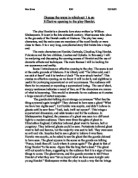Wray
Devante Wray
Ms. Yam
ENG4U1
March 26, 2012
Deceptions and Lies
In Shakespeare’s Elizabethan tragedy, Hamlet is about a middle aged prince on a journey to seek vengeance for his father’s murder. Throughout Hamlet there is an ongoing theme of deception; deception is defined as the deliberate attempt to conceal, fabricate, manipulate by verbal or nonverbal means in order to make one believe in something false. Stephanie Ericssion who is famous for her essay “The Way We Lie” relates with Shakespeare’s Hamlet. Stephanie has ten theory’s describing how one lies which is why her essay and Hamlet relate, Shakespeare’s play is merely fuelled by deception and lying. Ericssion’s essay goes into great detail examining and explaining the ways we lie. Moreover, at the beginning of the play Hamlet has an encounter with his deceased father who informs him how he really dies. The ghost tells Hamlet that he did not die from the bite of a serpent but by the hands of his brother Claudius. Claudius secretly snuck up on king Hamlet and poisoned him while he was sleeping. Then, Hamlet’s Uncle Claudius claims the position as king. Polonius, Claudius’ right hand man sneaks around the play manipulating and deceiving character which eventually lead him to his downfall. The theme of deception plays an impact role in Shakespeare’s Hamlet, and eventually leads Claudius, Polonius, and Hamlet to their demise.
Firstly, in Shakespeare’s Hamlet, Claudius’ demise was a result of his constant lying; his lying scheme are similar to Stephanie Ericssion’s omission, and dismissal theories. Claudius is looked at as the villain in the play; he secretly kills Old Hamlet in the hopes to take over his throne. He used deceitful lies to manipulate characters in to thinking that he was the good guy. However, his lies would soon come full circle, resulting in his brutal unnatural death. Claudius lies the most in Hamlet; as soon as the play starts he had already lied about how Old Hamlet died. He stated that Old Hamlet died from the bite of a serpent, but in actuality Claudius poisoned him “The harlot’s cheek, beautied with plastering art. Is not more ugly to the thing that helps I than is my deed to my most painted word: O heavy burthen!” (3.1.50). This quotes shows how Claudius lied to everyone about the death of Old Hamlet, because Claudius is showing signs of guilt. Also, the following quote relates to Ericssion’s dismissal theory. The dismissal lie is when one completely dismisses feeling or obvious facts to hide his or her from feeling guilty. Furthermore, as the play progress so does Claudius’ lies, they begin to impact more and more characters. Claudius deceives and lies to Rosencrantz and Guildenstern about Hamlets journey to England, he told them that Hamlet needs to leave Denmark for the interest of public safety. In reality Claudius was planning to kill Hamlet once he reach’s England “Our sovereign process, which imports at full, By letters congruing to that effect. The present death of Hamlet.” (4.3.64-6). This quote joins with Ericssion’s omission theory, which is when one does not tell the full truth and just bits and pieces of it. Eventually, the lies of Claudius soon lead him to his demise and many other characters such a Polonius.








